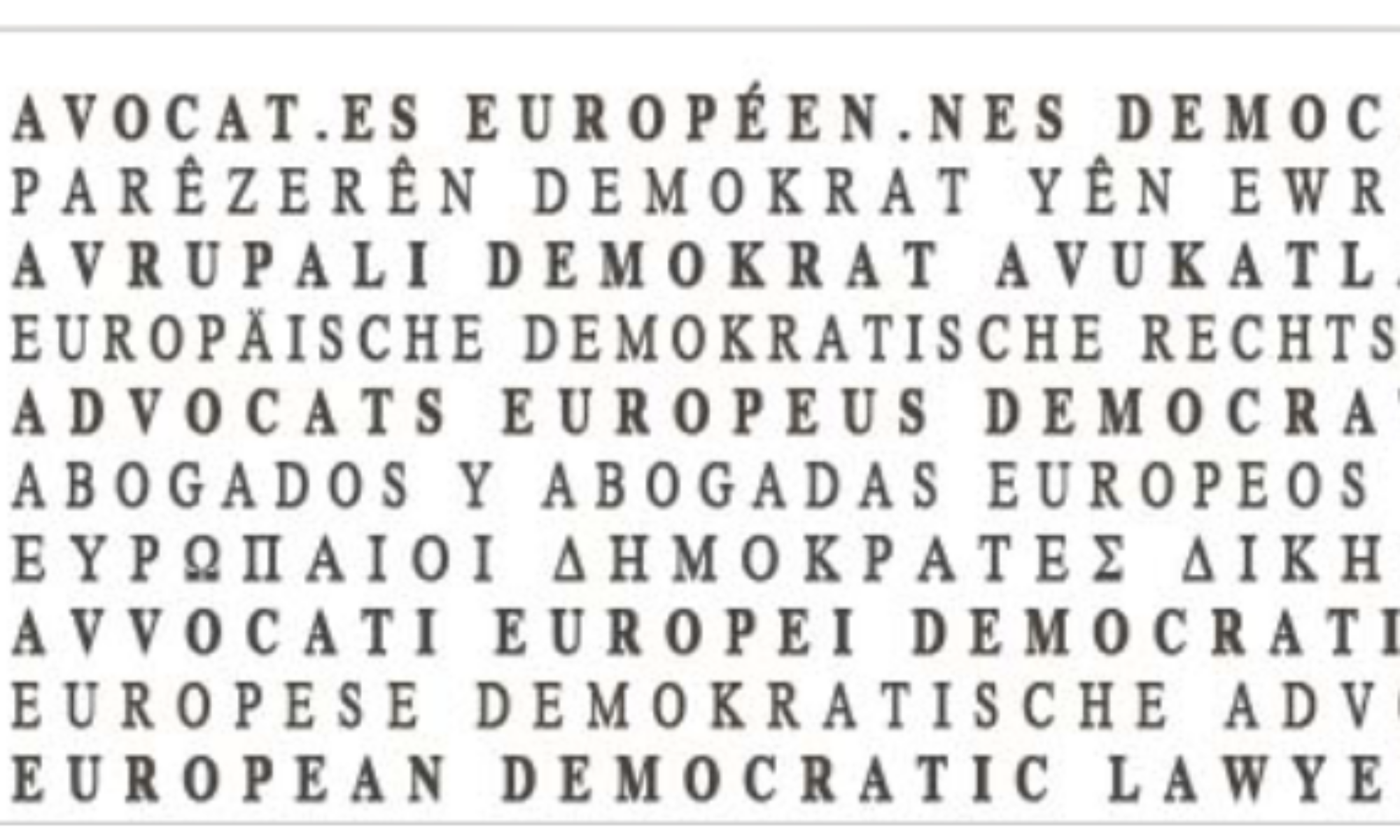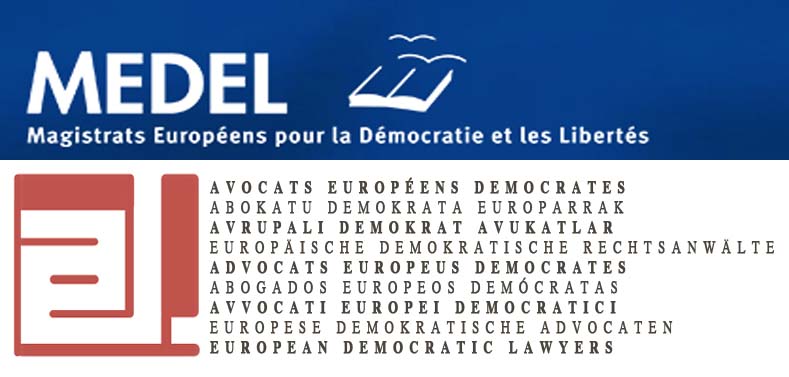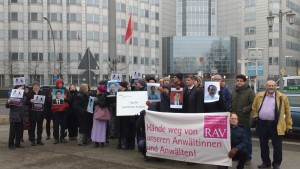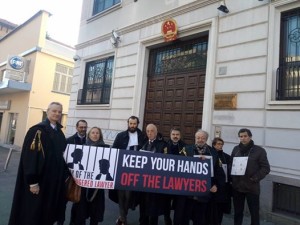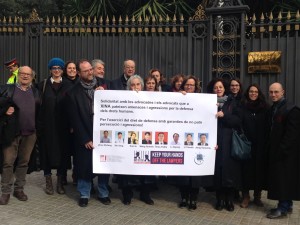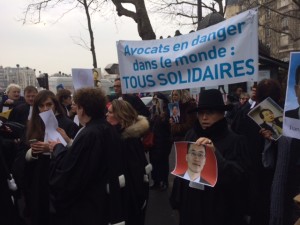A Background Paper for the Pan African Lawyers Union Conference, Nairobi, October 12-15, 2016
Introduction
The authors of this paper are Gill H. Boehringer and Stuart Russell of the International Association of People’s Lawyers. The IAPL was created in 2000 to gather lawyers involved in the legal support of collective struggles for people’s rights and in situations of gross rights violations. The IAPL Monitoring Committee on Attacks on Lawyers was created in 2014 and maintains a very extensive blog documenting such attacks.
This paper is endorsed by:
the International Observatory for Lawyers in Danger (OIAD for its French acronym), was relaunched in 2015 by the Paris Bar, the French National Bar Association, as well as the Italian and Spanish National Bar Associations, and also aims to bring any kind of support a lawyer under threat may need.
Endangered Lawyers | Avvocati Minacciati was started in 2015, and later officially presented in 2016 to the Italian Criminal Lawyers Association (Unione Camere Penali Italiane or UCPI). It is coordinated by Italian lawyers Nicola Canestrini and Ezio Menzione.
Created in 2001, the European Bar Human Rights Institute (IDHAE) monitors human rights protection, the training of lawyers in international human rights law, interventions, regardless of the limitations of borders, in favour of freedom and the fundamental rights of lawyers, organizes the World Observatory for Defence Rights and attacks against lawyers, workshops, symposia and seminars related to publications on international human rights law.
Created in 2010, the purpose of the Day of the Endangered Lawyer Foundation is to “call attention on that day to threatened human rights lawyers with special attention to one designated country.”
Avocats Européens Démocrates/European Democratic Lawyers (AED/EDL), founded in 1987, is a professional confederation of lawyer unions and organizations. On the international level it promotes the rights of defence and especially seeks to preserve the physical integrity, as well as the political and economic freedoms of lawyers.
Current situation
Today, in many countries of the world, it is dangerous to be a lawyer. This is especially true if the lawyer is attempting to protect the rights of the people against corporate or government interests or is uncovering corruption. Attacks on lawyers include both physical and non-physical interference with a lawyer’s capacity to perform his/her professional duty to the client or the court. Examples of the former could be assassination or extra judicial killing (EJKs), involuntary disappearance or wrongful detention, often accompanied by torture. Non-physical attacks are many and various e.g. threats, intimidation and harassment, unjustified professional disciplinary proceedings, illegal failure by the prosecution to make material evidence available to the lawyer, non-provision of legal aid, SLAPP suits such as libel actions. These examples are only the tip of the iceberg as we have been surprised at the extent to which lawyers are under attack and the innovative methods used to prevent lawyers from fulfilling their professional duties.
Many organisations around the globe are working to defend and protect lawyers by 1) monitoring the attacks, 2) publicizing the phenomenon, and 3) providing support for the lawyers under attack (for example, rapid response to attend and observe trials of lawyers). Our paper is a joint effort by members of some of the most prominent of such organisations. It is our hope that out of the PALU conference will come ideas and recommendations that will contribute to the worldwide movement for defending and protecting lawyers. In particular, of course, we would look to the development of a Pan African initiative tailored to your specific circumstances, which would deal with what appears to be an upward trend in attacks against lawyers in the African continent. Participants in the conference will be better equipped than we to specify what form such an initiative(s) should take. One of the purposes of this background paper is to provide information about what is (and is not) happening around the world in order to assist participants in designing a strategy for the protection and defence of African lawyers.
To provide an initial empirical basis for your discussion, we indicate the basic results of the data collection activity of the IAPL Monitoring Committee, we list below the number of countries by region where the Committee has received credible reports of attacks on lawyers:
AFRICA: 35 (36 if the self-declared Republic of Somaliland is included), ASIA: 20, CARIBBEAN: 4 (includes Puerto Rico), CENTRAL AMERICA: 7, EUROPE: 15, MIDDLE EAST : 12 (includes Israel and Turkey), NORTH AMERICA: 2 (USA, Canada), PACIFIC: 7 (includes Australia and New Zealand), SOUTH AMERICA: 8.
As for African countries, we have recorded attacks from: Algeria; Angola; Botswana; Burkina Faso; Burundi; Cameroun; Comoros; Congo; Republic of (Congo-Brazzaville); Democratic Republic of Congo; Egypt; Equatorial Guinea; Eritrea; Guinea-Bissau; Kenya; Lesotho; Liberia; Libya; Mauritania; Morocco; Mozambique; Niger; Nigeria; Rwanda; Senegal; Somalia; Somaliland; Republic of South Africa; South Sudan; Sudan; Swaziland; Tanzania; The Gambia; Tunisia; Uganda; Zambia; and Zimbabwe.
There are several comments to be made on these figures. First, countries have differing degrees of “intensity” of attacks. Thus a country may be on the IAPL list because of a single credible report of an attack, as is the case in many of the African countries. Alternatively, a number of our listed countries have a high degree of intensity. Countries such as Egypt, Honduras, Pakistan, Philippines, Turkey and China would be in the high intensity category as there have been many reported attacks in these countries, and they are continuing often with impunity for the perpetrators of human rights abuses.
Second, we believe it is certainly the case that there are many more countries where attacks on lawyers have occurred. We just have not received information on attacks in those countries. That is a gap in our monitoring that we are seeking to improve through broadening our network of informants. Another factor that makes the data incomplete is what criminologists call “the dark figure of crime”. According to this well-established concept, there are many crimes that are never reported at the country level and therefore cannot be reported even if there is a reliable source. Crimes go unreported for many reasons and, surely, the same is true of the attacks on lawyers e.g. with regard to physical attacks there may be threats of retribution. In the case of non-physical attacks it may be the lawyer-victim does not even realize the attack has occurred, e.g. prosecutor’s tricks to prevent the lawyer from fulfilling his/her duty unbeknownst to the lawyer.
Egypt : a test case of repression against lawyers and international solidarity
Since President Sisi came to power in 2014 Egyptian lawyers have suffered waves of repression amidst a human rights crisis resulting from his campaign against Islamists. Lawyers have repeatedly been arrested and persecuted to force them to avoid political cases. At its peak in November 2015 more than 200 lawyers were behind bars.
Fortunately that number has decreased to a handful of reported cases as of September 2016. The best-known case is that of Malek Adly, a prominent human rights lawyer, founder of the Front for the Defence of Egyptian Protesters and Director of the Lawyers Network at the Egyptian Center for Social and Economic Rights (ECESR). Arrested on 5 May 2016 he endured solitary confinement until 28 August, when he was released despite a prosecution appeal. Adly has represented countless peaceful protesters and civil society organizations, and is leading a group of lawyers who launched a legal action against Egypt’s decision to transfer two Red Sea islands to Saudi Arabia. The State Administrative Court upheld the complainants’ case, thereby annulling the transfer of the islands. The government appealed.
He was accused of attempting to overthrow the ruling régime, affiliation to a banned organization, and broadcasting false news, inter alia, all of which he denied, although formal charges have not been laid. However, these serious charges could still be brought against him, resulting in a re-arrest. Adly was admitted to the prison hospital several times, and suffers severe health conditions. Lengthy pretrial detention – in some cases lasting between one to three years – has been used by the Sisi régime against dissidents, exceeding international legal standards.
In July the Robert F. Kennedy Human Rights Center in the U.S. submitted an urgent action and petition to the UN Working Group on Arbitrary Detention and an urgent action to the UN Special Rapporteur on Torture on behalf of Adly. Similarly, a number of international human rights organizations have taken up Adly’s cause, including the Observatory for the Protection of Human Rights Defenders, a partnership of the International Federation of Human Rights (FIDH) and the World Organisation Against Torture (OMCT), the International Observatory of Lawyers in Danger (OIAD) and the European Human Rights Institute (IDHAE). They called for his immediate release and all charges to be dropped. A very high-profile Facebook-based support group has also been campaigning on his behalf : Free Malek Adly مالك عدلي حر More recently a number of international lawyers signed a petition calling for his release and for the charges to be dropped. It is now available online for additional signatures : https://www.change.org/p/egyptian-minister-of-the-interior-release-egyptian-lawyer-malek-adly
Adly’s wife and defence team filed a lawsuit against prison authorities and the Minister of Interior to end his solitary confinement. However, in a surprise move a court ordered his release on 25 August.
There has been other good news for Egyptian lawyers recently. On 13 August human rights lawyer Mahienour El-Massry who was jailed for “storming” an Alexandria police station in 2013 but has recently been released. She was initially sentenced to a two year sentence along with eight others on charges of “protesting without authorisation, damaging property” and “injuring policemen”. However a retrial in May 2015 saw the defendants’ sentence decreased to 15 months. While imprisoned, El-Massry was awarded the prestigious lawyers’ 2014 Ludovic Trarieux International Human Rights Award for her contributions to the defence of human rights. She was the second lawyer to be awarded the international award while in prison since Nelson Mandela in 1985.
We believe that the strong display of international solidarity in these cases has had a significant impact on the Sisi government and exemplifies the possibilities for the lawyers of the world to defend their foreign colleagues under attack.
The situation facing Egyptian lawyers remains very dangerous and alarming. It is important that in the case of Egypt (and other countries in Africa where similar government repression exists), that African lawyers, their organizations, Bar associations and human rights groups demonstrate their solidarity for their Egyptian colleagues, support the immediate release of those lawyers behind bars, and call for all charges to be dropped.
Has enough been done to defend lawyers?
The work done by the advocacy groups such as those which have authored this paper can cover a wide range of activities, in advocacy, support and solidarity. A great deal of time and energy is spent on recording and reporting attacks, passing resolutions at meetings of lawyers’ associations and writing to government ministers and international bodies about the situation of their foreign colleagues; attempting to pressure political parties, individual legislators and even governments to act positively in the matter; making visits to the country concerned, especially if lawyers are on trial, then publishing an account. These are not the only solidarity activities being carried out, as a visit to a number of groups’ websites would reveal various other programmes and activities, commissions, and research projects, but we believe that, in the main, short-term reactive initiatives are undertaken.
Is this enough? Have efforts to support lawyers been adequately coordinated? Have they been successful? With all due respect to those who have thrown themselves into the effort wholeheartedly, our answer to all three questions must be, we think probably not as successful as we would like. More needs to be done, more effectively. We say this with hesitancy as much has been done but, sadly, the killings continue and there appears to be a trend of increasing violence towards our colleagues. That certainly appears to be the case in Africa. We believe some new thinking, new methods and some new strategies should be developed.
Towards a strategic agenda
The basic question remains: what can be done to combat the onslaught on lawyers? Our research has highlighted a major gap. While there are many groups taking actions to support lawyers under threat, there is insufficient coordination of these efforts. Thus we suggest, as a first and urgent step, an International Summit Conference be called to bring together groups from around the world who are involved in actions to defend the lawyers. It would be expected to develop a strategic plan, emphasising coordination, planning and funding of an agenda to protect lawyers but, importantly, to develop strategies — short and long term — to reduce the dangers they face. The Conference would feature structured practical workshops to share our knowledge and experience in order to develop a collective capacity to support those who are at risk.
Such a Conference, (or perhaps initially a regional African Conference) bringing together a wide cross section of people and support groups, including but not limited to, lawyers, victims, and activists, would also have significant spin-offs, and would surely catch the attention of the major media and social media. Such publicity as we expect would follow, would bring before the world, in a focused way, the seriousness of the problem. It would put international pressure from a newly informed public opinion on governments and lawyers’ professional associations in countries where lawyers are at serious risk and, thus far, have not been given adequate protection.
In order to develop an agenda for discussion at such an event, we offer some ideas of how we in the movement to protect and defend lawyers, can express in a practical way our solidarity with lawyers threatened with attacks. Our suggestions are in addition to the usual legal approaches in dealing with human rights violations, national and international, that will be familiar to the lawyers of PALU and their practicing colleagues inside government institutions and in private practice. Some of the elements of a comprehensive programme of support could include:
1. One of the most effective ways to defend and protect lawyers being tried for their legal work is to have a “first responder” legal team of observers from another country, or region, travel immediately to the site of the trial in order to provide on the ground support and, where useful, legal/political advice and/or pressure on the prosecution. Such teams could be organised through PALU. There are models for this operating, for example in Europe and in The Philippines.
2. Establishment of an international network specifically dedicated to the defence of lawyers would be an important step. As indicated above, we lack information from many countries, therefore we lack accurate and comprehensive macro data on the killings and disappearances of lawyers, let alone other attacks. In order to encourage the public and governments to take the problem seriously and consistently, they need to know the extent of the carnage out there.
3. The establishment of a network of regional Centres for the Support of Lawyers Under Attack (to get the Centres started, perhaps they could be organized on a country basis.) PALU would be the obvious organisation to take the lead in getting the Centres operational. The purpose of the Centres: to monitor attacks on lawyers: collect, record, and analyse information specifically on attacks on lawyers. As the Centres develop they could provide commentary and publicity on the issue; such Centres could assist in organising, publicising and coordinating support activities in the region, such as country visits and reports back. These Centres might be organised by Bar Associations, NGOs, in an academic institution, or an alliance of such institutions.
4. Regional seminars and workshops on the problem, based on research and experience of combating the attacks. These could be organised by national or regional Centres mentioned above, but also through independent Human Rights Centres such as the Gulf Centre for Human Rights and the Asian Centre for Human Rights, or a university Human Rights Centre which may be connected with a Law Faculty. Many of the latter exist around the globe and there are various models that could be adopted.
5. An annual international lecture, widely publicised, by an outstanding human rights defender, not necessarily a lawyer, on the threats to lawyers, perhaps focusing on a different country each year, and perhaps to take place in a different country each year.
6. There has emerged in recent years an annual Day of the Endangered Lawyer (organized by the Day of the Endangered Lawyer Foundation), with activities in many countries on 24 January, especially protests of lawyers in robes in front of the designated country’s embassies and consulates. It would be an opportunity for African lawyers and their professional associations to commemorate the deaths and other attacks on lawyers in their countries and across the continent. With public events and media briefings, the problem could be brought to the attention of civil society and NGOs, religious institutions and other concerned groups and individuals, thus bringing pressure on governments to respond in a positive manner. In 2016 Honduras, with several hundred lawyers assassinated in recent years, was the country focused on. In 2017 it will be China, due to the severe and continuing crackdown on the entire community of human rights lawyers which involves lengthy detentions and serious human rights violations to the lawyers, their staff and families.
7. Support for speaking tours and visits of lawyers and other human rights defenders who have first-hand knowledge/experience of dealing with attacks on lawyers. Such visits could be to professional associations, academic campuses and other venues in the countries facing serious attacks/threats on lawyers (hereafter CFALs).
8. Visits by lawyers and human rights activists from CFALs to countries where they can have discussions with government officials, professional associations and other legal and activist groups, as well as access to the media. The purpose, to exchange information and experience, and also to build solidarity links with appropriate institutions, national and international.
9. Legal assistance whereby foreign lawyers work with local lawyers to try to get prosecutions and convictions, especially in countries where impunity exists for the perpetrators. This is not so much because locals need legal help, but because the involvement of a foreign lawyer might make government officials “try harder” under the gaze of the international legal community. There might be value in a programme of internships for law students and young lawyers as a part of such a legal assistance scheme. These suggestions, and others we are canvassing would, of course, have to be worked out with local lawyers.
10. Educational work with journalists is important. Killings of lawyers get far less publicity than those of journalists, although in some countries more lawyers are killed. Many journalists would be sympathetic given what is happening to their colleagues; we just need to give them accurate information in an easy-to-use format. We recognise that the major media is not free nor objective, and journalists operate within restrictions, nevertheless on this issue they may be able to assist in our project, even by using alternative forms of media.
11. Educational work with NGOs and civil society organisations is also important. These are organisations with the power to affect public opinion. They have an interest in the safety of lawyers in CFALs with whom they sometimes work and with whom they share the dangers of confronting human rights abuse.
12. Educational work with university law faculties, and others, could include the development of units in the curriculum (either undergraduate or postgraduate) on lawyers as heroes and victims of political systems and social structures, perhaps with the award of prizes for outstanding theses or publications arising from their study. In this way building awareness and solidarity with our future professional colleagues.
13. The creation, possibly under PALU leadership, of a monthly e-newsletter with information about the current attacks on lawyers across the continent, and other material relevant to the defence and protection of lawyers. There might also be interest in a series of working papers or reports on these phenomena.
14. Political work should be undertaken in all countries to convince political parties and governments to apply sanctions against countries where the attacks on lawyers are continuing without arrests, prosecutions and convictions. Statements of concern are not sufficient. The USA has laws restricting the supply of war materiel to countries where human rights violations are persistent and systemic. Such a policy, if enforced, could be effective in convincing governments that they need to take action to protect their lawyers and find and punish the guilty.
15. Through political work, making legislation which specifically protects lawyers. Brazil has legislation that provides a comprehensive range of rights specifically for lawyers. It would also be important, at least symbolically, to adopt in specific legislation the UN Basic Principles on the Role of Lawyers and to ensure that it is studied in law curricula. We would also see value in strengthening the understanding of the UN adopted Algiers Universal Declaration of Peoples’ Rights which culturally has great resonance to the African people. Many lawyers are attacked because they are defending peoples’ rights laid down in the Algiers Declaration.
16. A campaign should be developed for universal national “human rights budgets” with specific allocations for the protection of defenders (lawyers, journalists and others), with, of course, annual reports on the impact of such budget allocations.
17. Political work to seek governmental and/or parliamentary resolutions condemning the lack of protection of lawyers, but also requesting the institution of parliamentary hearings to expose the “protection gap” in CFALs especially. This could be an important step vis-à-vis countries vulnerable to a change in public opinion and government policy, e.g. in regard to aid and/or trade.
18. Juridical work which would see violating countries, and individuals, arraigned in the appropriate international tribunals, or in countries such as Spain which allows prosecution for extra-territorial offences.
19. An international People’s Tribunal would be an excellent vehicle for an investigation to deal comprehensively with attacks on lawyers as a major threat to a humane existence for those millions who often must rely on courageous lawyers to defend them from state power and the greed of those who employ, or are responsible for, assassins who attack lawyers. The Permanent People’s Tribunal has indicated a willingness to hold such a session. It has already been in discussions with several organisations on the possibility of such a project. African lawyers’ participation at this stage would be welcomed.
We are aware that the above programme, or even any part of it, would require considerable resources, financial and otherwise. One of the issues that needs to be considered urgently, and certainly at the suggested Conference, is the funding of the programmes and institutions we hope will be launched. Should a sound programme be developed, we expect that the lawyers of the wealthy countries will be able to find the money necessary. After all, with the global spread of lawyers from the USA and Europe, they have good reason to spend some of their profits seeking to ensure that they and their colleagues will be safe when working abroad.
Conclusion
We have abstained from a critical analysis of the fundamental causes of killings and other attacks on lawyers in Africa. That is a task for those who are working in the countries of that continent. Each country’s specific history, economic profile, cultural traditions, governmental institutions and policies, along with other factors, will have to be addressed in order to explain why the lawyers are being attacked and why at this juncture.
We regret we cannot be with you at the PALU Conference, but we stand in solidarity with you in your endeavours.
We wish you good luck in developing successful strategies for the defence of your professional colleagues in the future.
FOR MORE INFORMATION :
International Association of People’s Lawyers (IAPL)
Monitoring Committee on Attacks on Lawyers blog : https://defendlawyers.wordpress.com/
Blog email : jsrussell301254@gmail.com
Facebook : IAPL – International Association of People’s Lawyers
Website : http://iapl.net/
Avvocati minacciati / Endangered Lawyers
Website : http://www.endangeredlawyers.org/
Facebook : Avvocati minacciati / endangered Lawyers
Twitter : https://twitter.com/EndangeredL
International Observatory of Lawyers in Danger (OIAD)
Website: http://cnb.avocat.fr
Email : sedillot.avocat@gmail.com
European Bar Human Rights Institute (IDHAE)
Website : http://www.idhae.org/
Facebook : IDHAE
Day of the Endangered Lawyer Foundation
Website: http://dayoftheendangeredlawyer.eu/
Avocats Européens Démocrates/European Democratic Lawyers (AED/EDL)
Website: www.aeud.org
Facebook: https://www.facebook.com/aed.edl1987/
